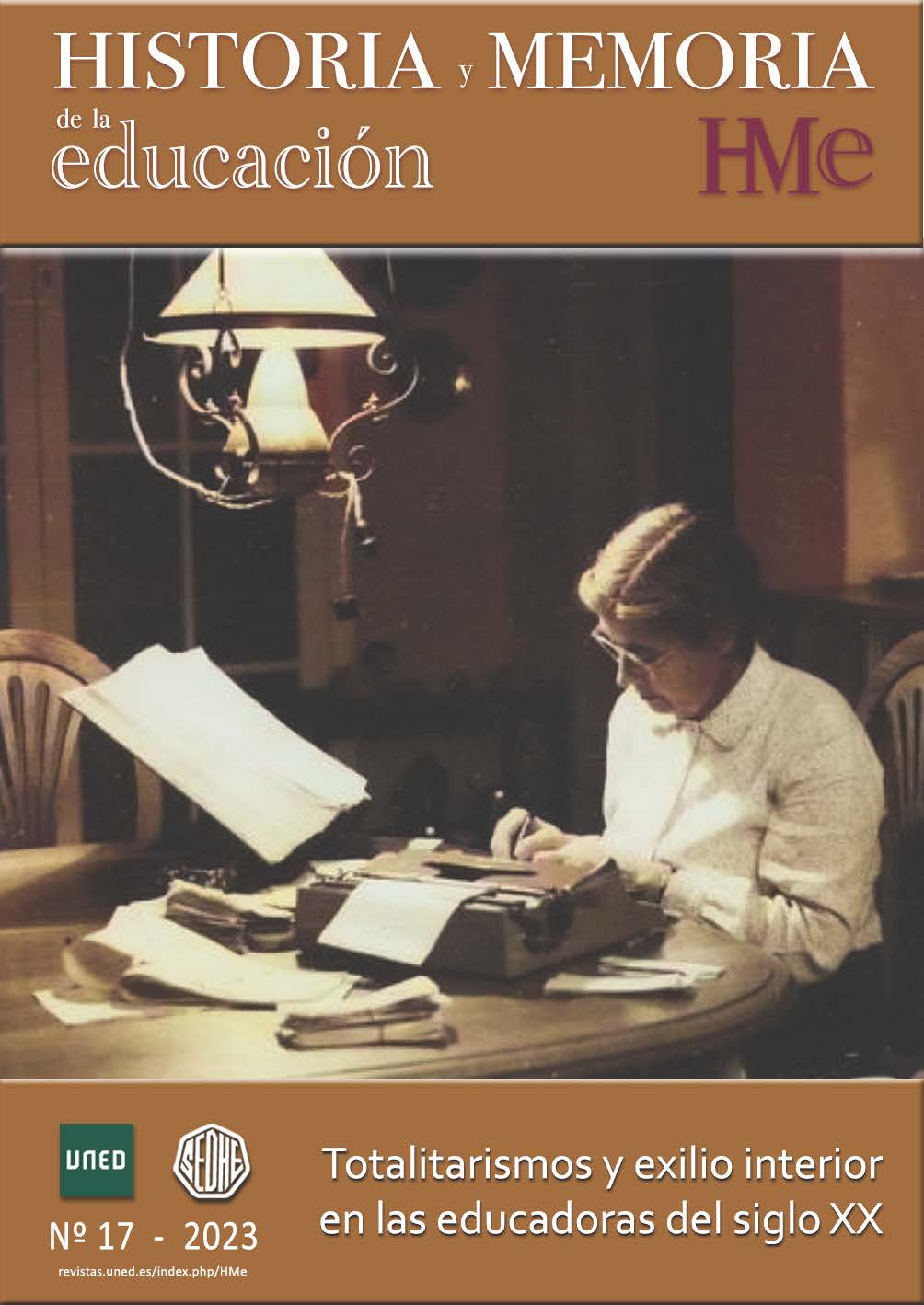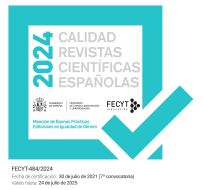El exilio interior y el destierro de las maestras australianas en un sistema escolar estatal centralizado y patriarcal
DOI:
https://doi.org/10.5944/hme.17.2023.33121Palabras clave:
Maestras, Prohibición del matrimonio, Patriarcado, Sistema escolar estatal centralizadoResumen
Este artículo explora las luchas de las maestras australianas por la igualdad con los hombres desde finales del siglo XIX hasta mediados del siglo XX. Aunque Australia pretendía ser una nación democrática progresista, los sistemas escolares estatales patriarcales centralizados dependían de las maestras para cumplir con los requisitos de la escolarización gratuita, obligatoria y laica. Este estudio se centra en el estado de Australia meridional, donde las mujeres obtuvieron el derecho al voto en 1894, muy por delante de los países europeos. Sin embargo, las maestras fueron sometidas a un exilio interior en el sistema escolar estatal, y desterradas por la barrera matrimonial. El artículo comienza con la construcción del sistema escolar estatal de Australia del Sur a finales del siglo XIX. La aplicación de la prohibición del matrimonio creó una profesión diferenciada de muchas mujeres jóvenes y solteras que enseñaban antes de casarse; unas pocas mujeres casadas que necesitaban un ingreso; y una cohorte de mujeres solteras de edad avanzada que hicieron de la enseñanza una carrera para toda la vida e impugnaron otras formas de subordinación a las que estaban sujetas todas las maestras. Encabezadas por este último grupo, las profesoras de Australia del Sur persiguieron la igualdad en los sindicatos mixtos de profesores de principios del siglo XX y en las organizaciones de mujeres posteriores al sufragio, y crearon el Women Teachers Guild en 1937 para garantizar unas condiciones de empleo más igualitarias. El documento concluye con la situación después de la Segunda Guerra Mundial, cuando las mujeres casadas fueron readmitidas en el sistema escolar estatal para resolver la escasez de maestros; y las campañas por la igualdad de salarios cobraron impulso. En Australia Meridional, la prohibición del matrimonio se eliminó finalmente en 1972.
Descargas
Citas
Bradley, Denise. Inequality of opportunity: a report from the women’s adviser to the Education Department of South Australia. Adelaide: Education Department of South Australia, 1978.
Cavanagh, Sheila. “Female teacher gender and sexuality in twentieth century Ontario, Canada” in History is hers: women educators in twentieth century Ontario, editors R. Coulter and H. Harper, 111-134. Calgary: Detselig Enterprises Ltd., 2005.
De Gabriel, Narciso. “The entrance of women into the teaching profession in Spain (1855-1940) “, History of Education, 43 no. 3 (2014): 334-355.
Donahue, David. “Rhode Island’s last holdout: tenure and married women teachers at the brink of the women’s movement”, History of Education Quarterly, 42 no. 1 (2002): 50-74.
Dwyer, Donna. “Justice at last? The Temporary Teachers Club and the Teaching Service (Married Women) Act 1956”, Labour History, 91 (2006): 151-168.
Flecha Garcia, Consuelo. “Education in Spain: close-up of its history in the twentieth century”, Analytical Reports in International Education, 4 no. 1 (2011): 17-42.
Garcia Hoz, Víctor. “The education of teachers in Spain”, Journal of Educational Research, XLIII no. 8 (1950): 561-570.
Hilliard, David. and Hunt, Arnold. “Religion”, in The Flinders history of South Australia: social history, editor E. Richards, 194-234. Adelaide: Wakefield Press, 1986.
Kyle, Noeline. “Woman’s ‘natural mission’ but man’s real domain: the masculinisation of the state elementary teaching service in New South Wales”, in Battlers and bluestockings: women’s place in Australian education, editors Sandra Taylor and Miriam Henry, 25-36. Canberra: Australian College of Education, 1988.
Mahamud, Kira and Ruiz-Funes, Mª José. “Reconstructing life histories of Spanish primary teachers”, History of Education, 43 no. 6 (2014): 793-819.
Martin, Elaine. “Social work, the family and women’s equality in post-war Australia”, Women’s History Review, 12 no. 3 (2003): 445-468.
Miller, Pavla. Long division: state schooling in South Australian society. Adelaide: Wakefield Press, 1986.
Oram, Alison. Women teachers and feminist politics 1900-1939. Manchester: Manchester University Press, 1996.
Portus, Garnet. “The totalitarian challenge to Australian education”, The Australian Quarterly, 12 no. 4 (1940): 75-80.
Pozo Andres, Mª del Mar and Braster, Sjaak. “The reinvention of the new education movement in the Franco dictatorship (Spain, 1936-1976) “, Paedagogica Historica, 42 no. 1-2 (2006): 109-126.
Roca, Miguel and Marti, Juan. “The pedagogical foundations of primary school inspector Leonor Serrano (1919-1939) “, Paedagogica Historica, 54 no. 3 (2018): 338-354.
San Roman Gago, Sonsoles. “The Spanish schoolmistress: from tradition to modernity”, Paedagogica Historica, 36 no. 2 (2000): 571-600.
San Roman, Sonsoles. “Professional identities of teachers during the social transformation toward democracy in Spain”, in Women and teaching: global perspectives on the feminisation of a profession, editors R. Cortina and S. San Roman, 23-50. New York: Palgrave Macmillan, 2006.
Sawer, Marian. Removal of the Commonwealth marriage bar: a documentary history. Canberra: Centre for Research in Public Sector Management, University of Canberra, 1997.
Terron, Aida; Comelles, Josep and Perdiguero-Gil, Enrique. “Schools and health education in Spain during the dictatorship of General Franco (1939-1975)”, History of Education Review, 46 no. 2 (2017): 208-223.
Theobald, Marjorie and Dwyer, Donna. “An episode in feminist politics: The Married Women (Lecturers and Teachers) Act, 1932-47”, Labour History, 76 (1999): 59-77.
Theobald, Marjorie. “And gladly teach? The making of a woman’s profession”, in Women teaching, women learning: historical perspectives, editors Elizabeth Smyth and Paula Bourne, 65-84. Toronto: Inanna Publications and Education Inc, 2006.
Theobald, Marjorie. Knowing women: origins of women's education in nineteenth-century Australia. Melbourne: Cambridge University Press, 1996.
Trethewey, Lynne. “‘Either you have misunderstood the directions, or you are not playing the game’: South Australian women in educational administration 1900-1960”, Journal of Educational Administration and History, 38 no. 1 (2006): 1-18.
Trethewey, Lynne. and Whitehead, Kay “The city as a site of women teachers’ post-suffrage political activism: Adelaide, South Australia”, Paedagogica Historica, 39 no. 1 /2 (2003): 107-120.
Vicary, Adrian. In the interests of education: a history of teacher unionism in South Australia. St Leonards: Allen & Unwin, 1997.
Whitehead, Kay. “Troubling gender relations with the appointment of ‘that lady inspector’ in post-suffrage South Australia” in“Femininity” and the history of women’s education, editors T. Allender and S. Spencer, 89-118. Palgrave Macmillan, Cham Switzerland, 2021.
Whitehead, Kay. “Vocation, career and character in early twentieth century women teachers’ work in city schools”, History of Education, 34, no. 6 (2005): 579-597.
Whitehead, Kay. “The spinster teacher in Australia from the 1870s to the 1960s”, History of Education Review, 36 no. 1 (2007): 1-17.
Descargas
Publicado
Cómo citar
Número
Sección
Licencia
Derechos de autor 2022 Historia y Memoria de la Educación

Esta obra está bajo una licencia internacional Creative Commons Atribución-NoComercial 4.0.

Reconocimiento – NoComercial (by-nc 4.0): Se permite la generación de obras derivadas siempre que no se haga un uso comercial. Tampoco se puede utilizar la obra original con finalidades comerciales.










